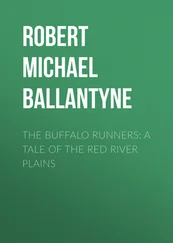Robert Michael Ballantyne - The Red Eric
Здесь есть возможность читать онлайн «Robert Michael Ballantyne - The Red Eric» — ознакомительный отрывок электронной книги совершенно бесплатно, а после прочтения отрывка купить полную версию. В некоторых случаях можно слушать аудио, скачать через торрент в формате fb2 и присутствует краткое содержание. Жанр: Детские приключения, literature_19, foreign_antique, foreign_prose, foreign_children, на английском языке. Описание произведения, (предисловие) а так же отзывы посетителей доступны на портале библиотеки ЛибКат.
- Название:The Red Eric
- Автор:
- Жанр:
- Год:неизвестен
- ISBN:нет данных
- Рейтинг книги:4 / 5. Голосов: 1
-
Избранное:Добавить в избранное
- Отзывы:
-
Ваша оценка:
- 80
- 1
- 2
- 3
- 4
- 5
The Red Eric: краткое содержание, описание и аннотация
Предлагаем к чтению аннотацию, описание, краткое содержание или предисловие (зависит от того, что написал сам автор книги «The Red Eric»). Если вы не нашли необходимую информацию о книге — напишите в комментариях, мы постараемся отыскать её.
The Red Eric — читать онлайн ознакомительный отрывок
Ниже представлен текст книги, разбитый по страницам. Система сохранения места последней прочитанной страницы, позволяет с удобством читать онлайн бесплатно книгу «The Red Eric», без необходимости каждый раз заново искать на чём Вы остановились. Поставьте закладку, и сможете в любой момент перейти на страницу, на которой закончили чтение.
Интервал:
Закладка:
While Rokens pondered the suggestion, a light plash was heard close to the ship’s side, and a voice said, in a hoarse whisper, “Heave us a rope, will ye. Look alive, now. Guess I’ll go under in two minits if ye don’t.”
“Oho!” exclaimed Rokens, in a low, impressive voice, as he threw over the end of a rope, and, with the aid of the other members of the watch, hauled Nikel Sling up the side, and landed him dripping and panting on the deck.
“W’y—Sling! what on airth—?” exclaimed one of the men.
“It’s lucky—I am—on airth—” panted the tall cook, seating himself on the breech of one of the main-deck carronades, and wringing the water from his garments. “An’ it’s well I’m not at the bottom o’ this ’ere ’arbour.”
“But where did ye come from, an’ why are they arter ye, lad?” inquired Rokens.
“W’y? ’cause they don’t want to part with me, and I’ve gi’n them the slip, I guess.”
When Nikel Sling had recovered himself so as to talk connectedly, he explained to his wondering shipmates how that, after being floored in the street, he had been carried up to the hospital, and on recovering his senses, found Mr Millons standing by the bedside, conversing with the young surgeons. The first words of their conversation showed him that something was wrong, so, with remarkable self-possession, he resolved to counterfeit partial delirium, by which means he contrived to give the first mate a hint that all was right, and declined, without creating suspicion, to give any intelligible answers as to who he was or where he had come from.
The blow on his head caused him considerable pain, but his mind was relieved by one of the young surgeons, who remarked to another, in going round the wards, that the “skull of that long chap wasn’t fractured after all, and he had no doubt he would be dismissed cured in a day or two.” So the cook lay quiet until it was dark.
When the house-surgeon had paid his last visit, and the nurses had gone their rounds in the accident-ward, and no sound disturbed the quiet of the dimly-lighted apartment save the heavy fitful breathing and occasional moans and restless motions of the sufferers, Nikel Sling raised himself on his elbow, and glanced stealthily round on the rows of pain-worn and haggard countenances around him. It was a solemn sight to look upon, especially at that silent hour of the night. There were men there with almost every species of painful wound and fracture. Some had been long there, wasting away from day to day, and now lay quiet, though suffering, from sheer exhaustion. Others there were who had been carried in that day, and fidgeted impatiently in their unreduced strength, yet nervously in their agony; or, in some cases, where the fear of death was on them, clasped their hands and prayed in whispers for mercy to Him whose name perhaps they had almost never used before except for the purpose of taking it in vain.
But such sights had little or no effect on the cook, who had rubbed hard against the world’s roughest sides too long to be easily affected by the sight of human suffering, especially when exhibited in men. He paused long enough to note that the nurses were out of the way or dozing, and then slipping out of bed, he stalked across the room like a ghost, and made for the outer gateway of the hospital. He knew the way, having once before been a temporary inmate of the place. He reached the gate undiscovered, tripped up the porter’s heels, opened the wicket, and fled towards the harbour, followed by the porter and a knot of chance passers-by. The pursuers swelled into a crowd as he neared the harbour.
Besides being long-limbed, Nikel Sling was nimble. He distanced his pursuers easily, and, as we have seen, swam off and reached his ship almost as soon as they gained the end of the wharf.
The above narration was made much more abruptly and shortly than we have presented it, for oars were soon heard in the water, and it behoved the poor hunted cook to secrete himself in case they should take a fancy to search the vessel. Just as the boat came within a few yards of the ship he hastily went below.
“Boat ahoy!” shouted Tim Rokens; “wot boat’s that?”
The men lay on their oars.
“Have you a madman on board your ship?” inquired the gatekeeper of the hospital, whose wrath at the unceremonious treatment he had received had not yet cooled down.
“No,” answered Rokens, laying his arms on the bulwarks, and looking down at his questioner with a sly leer; “no, we ha’n’t, but you’ve got a madman aboord that boat.”
“Who’s that?” inquired the warder, who did not at first understand the sarcasm.
“Why, yourself, to be sure,” replied Rokens, “an’ the sooner you takes yourself off, an’ comes to an anchor in a loo-natick asylum, the better for all parties consarned.”
“No, but I’m in earnest, my man—”
“ As far as that goes,” interrupted the imperturbable Rokens, “so am I.”
“The man,” continued the gatekeeper, “has run out of the hospital with a smashed head, I calc’late, stark starin’ mad, and gone off the end o’ the w’arf into the water—”
“You don’t mean it!” shouted Rokens, starting with affected surprise. “Now you are a fine fellow, ain’t you, to be talkin’ here an’ wastin’ time while a poor feller-mortal is bein’ drownded, or has gone and swummed off to sea—p’r’aps without chart, compass, or rudder! Hallo, lads! tumble up there! Man overboard! tumble up, tumble up!”
In less than three minutes half-a-dozen men sprang up the hatchway, hauled up the gig which swung astern, tumbled into it, and began to pull wildly about the harbour in search of the drowning man. The shouts and commotion roused the crews of the nearest vessels, and ere long quite a fleet of boats joined in the search.
“Wos he a big or a little feller?” inquired Rokens, panting from his exertions, as he swept up to the boat containing the hospital warder, round which several of the other boats began to congregate.
“A big fellow, I guess, with legs like steeples. He was sloping when they floored him. A thief, I expect he must ha’ bin.”
“A thief!” echoed Rokens, in disgust; “why didn’t ye say, so at first? If he’s a thief, he’s born to be hanged, so he’s safe and snug aboard his ship long ago, I’ll be bound. Good-night t’ye, friend, and better luck next time.”
A loud laugh greeted the ears of the discomfited warder as the crews of the boats dipped their oars in the water and pulled towards, their respective ships.
Next morning, about daybreak, little Alice Dunning came on board her father’s ship, accompanied by her two aunts, who, for once, became utterly and publicly regardless of appearances and contemptuous of all propriety, as they sobbed on the child’s neck and positively refused to be comforted.
Just as the sun rose, and edged the horizon with a gleam of liquid fire, the Red Eric spread her sails and stood out to sea.
Chapter Five.
Day Dreams and Adventures among the Clouds—A Chase, a Battle, and a Victory
Early morning on the ocean! There is poetry in the idea; there is music in the very sound. As there is nothing new under the sun, probably a song exists with this or a similar title; if not, we now recommend it earnestly to musicians.
Ailie Dunning sat on the bulwarks of the Red Eric , holding on tightly by the mizzen-shrouds, and gazing in open-eyed, open-mouthed, inexpressible delight upon the bright calm sea. She was far, far out upon the bosom of the Atlantic now. Sea-sickness—which during the first part of the voyage, had changed the warm pink of her pretty face into every imaginable shade of green—was gone, and the hue of health could not now be banished even by the rudest storm. In short, she had become a thorough sailor, and took special delight in turning her face to windward during the wild storm, and drinking-in the howling blast as she held on by the rigid shrouds, and laughed at the dashing spray—for little Ailie was not easily frightened. Martha and Jane Dunning had made it their first care to implant in the heart of their charge a knowledge of our Saviour’s love, and especially of His tenderness towards, and watchful care over, the lambs of His flock. Besides this, little Ailie was naturally of a trustful disposition. She had implicit confidence in the strength and wisdom of her father, and it never entered into her imagination to dream that it was possible for any evil to befall the ship which he commanded.
Читать дальшеИнтервал:
Закладка:
Похожие книги на «The Red Eric»
Представляем Вашему вниманию похожие книги на «The Red Eric» списком для выбора. Мы отобрали схожую по названию и смыслу литературу в надежде предоставить читателям больше вариантов отыскать новые, интересные, ещё непрочитанные произведения.
Обсуждение, отзывы о книге «The Red Eric» и просто собственные мнения читателей. Оставьте ваши комментарии, напишите, что Вы думаете о произведении, его смысле или главных героях. Укажите что конкретно понравилось, а что нет, и почему Вы так считаете.












